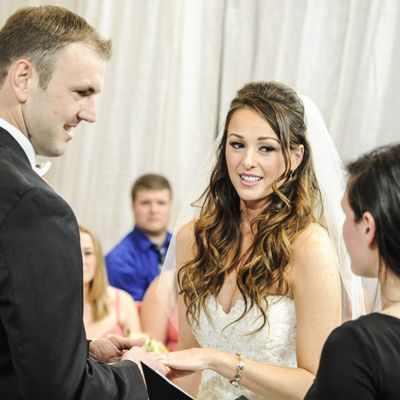
Dr. Logan Levkoff bears a heavy responsibility in these coming months. Along with her three onscreen colleagues — psychologist Dr. Joseph Cilona, sociology professor Dr. Pepper Schwartz, and spiritual advisor Greg Epstein — the New York–based sex educator will be pairing arranged couples for the second season of Married at First Sight, FYI Network’s first legitimate hit. Lest you missed Married’s inaugural experiment, which wrapped up last week and will reconvene its subjects for the requisite reunion special tonight at 9 p.m., here’s our handy overview of how three pairs of strangers turned newlyweds lived happily (or not so much) ever after. Vulture called up Dr. Levkoff to discuss how the provocative series can maintain its integrity going into season two, what they’re looking for as they set about selecting the cast, and why a show that Dr. Levkoff herself describes as “definitely not The Bachelor” featured a former Bachelor contestant.
Two notable outlets wrote scathing op-eds about the show, but only based on the premiere episode or after a binge leading up to the finale, respectively. Do you think it’s better to watch a program like this in real time, to experience the journey along with the participants?
Yes. It’s interesting, because we all signed onboard in order to create a public discourse about relationships that is meaningful and thoughtful and different than all the things that you see. It has been such a pleasant surprise to really see how our participants’ journey has unfolded in the Twitterverse and social media. And I think binge-watching is great. It’s not that you can’t get something out of it, but to see the real take-home value, you have to be following the conversations online. I understand why there has been criticism. I understand people’s reaction to the title or the premise. We’ve had this history of unscripted television shows being scripted docu-soap[s], the antithesis of anything that’s real. But this really is the antithesis of that. It is certainly not scripted. Jamie freaking out on camera about how she didn’t like the way her husband looked, that’s not a pretty television moment. It’s authentic, and the only way to do something like this with integrity is to make sure we don’t tell them what to do, and clearly we don’t.
What about detractors who say the show’s concept has nothing in common with traditional arranged marriages?
We’ve never claimed this is a traditional arrangement. It’s not. It is a social commentary on how we find partnerships today. The fact is, online dating and Tinder look nothing like traditional dating. I think, in this world, where we check off lots of little boxes about what we want and we watch the numbers of our potential pools become bigger or smaller, it almost becomes paralyzing. We don’t know what we look for anymore, the grass is always greener, we jump at the first obstacle because we don’t necessarily want to put the work on. This isn’t right for everyone, because it certainly isn’t, but if we say automatically we’re not going to do something, then we lose the possibility of something really special. So it’s just another alternative to what we do to find partnerships today.
At some point, producers discussed that this would simply be good TV. When did it become more about handling the concept responsibly?
Right from the beginning. I can only speak to what happened when we came onboard as experts. You get a call, like I did, where they say, “We want you to blindly arrange marriages,” and you say no. I said no. I’m sure I had some profanity attached to it. I called the manager I work with and she said, “I feel like you should take this call. I don’t get the sense that this is what you think it is. And I sat and listened and asked all the right questions, like, “Who gets voted off the island?” and “Who wins the pile of money?” and “At what point do the experts do something so horrible that we can’t operate in the real world?” And she said, “This is not that kind of show.” Casting is a rough word, because casting makes it seem like these people are actors. And this wasn’t “cast.” I don’t have a better word for it, really, because in the TV world, there’s not a new term that validates this particular experience. But the four of us looked at production and said, “If we don’t find compatible matches, were not doing it. We’re not putting people together for the sake of a TV show.”
Were the initial applicants culled entirely from a cryptic casting call, or did you also scour dating sites?
That was done originally by production, certainly through some websites, and I would imagine some cryptic casting calls. Because you really don’t want to give the reveal, because you’re going to get the wrong people and lose the people who really should be a part of it. Which I think we all understand makes season two very challenging.
Even more loons will likely be applying now that the show has been out there. How are you going to keep the show true to its mission?
Look, we’re going to get all sorts of personalities. We’re going to get the people who are desperate to be on TV. We’re going to get the people who really want to be a part of this. The initial wave is going to have to be [up to] production to do the background checks and get the basic things taken care of first, which does change your pool. And then it’s going to be our responsibility to ask the right questions. It’s going to be a much longer process than it was the first time around, but I think we’re all committed and we don’t want to water this down. We don’t want to lose the authenticity we believe we had.
Do you feel extra pressure or anxiety heading into this season now that you’ve fully weighed the implications?
[Laughs.] Well, I think when you say you’re partially responsible for arranging blind marriages on television, you feel a huge amount of anxiety to begin with. Believe me, we were absolutely on a journey with them even though we didn’t see our couples every day. The day the weddings happened, I was texting all day and night, “Is everyone okay? What’s going on? I’m so nervous.” Because you feel responsible. I feel very protective over our participants. And when they get criticism over superficial, silly things, that upsets me. These individuals, whether you like them or not, have done something extraordinarily brave, and we don’t see everything.
How conscious were you, and are you, of casting interracial and non-heterosexual couples?
We’d be delighted to have gay couples involved, and ideally, that’s something we can do. With respect to the interracial issue, we never considered not having an interracial couple. It just had to work with the pool that we had, and in this case, we had participants who really were very comfortable being potentially married to someone of a different race, religion, or ethnicity, and some who really didn’t want to be. And deal breakers, in that sense, are deal breakers. This is enough of a leap of faith as it is. You don’t want to force someone to go against what they say is blatantly not okay with them. I asked those questions and gave the disclaimer that this is a judgment-free zone. If something doesn’t work for you, whether that’s race, whether that’s hair color, if they’re important to you, I need to know about it.
And now that a wider audience has seen the show, you’ll likely get a more diverse applicant pool.
Absolutely. And again, those are important questions that we don’t often ask ourselves. You know, really, what are our deal breakers? What are the things we can get past and sort of try, and what are the things that just go against who we are — good, bad or ugly. We definitely had participants who said, “I’m attracted to both black and white men,” “I’m not interested in this ethnicity,” but in matching you, it has to work for both.
How come it wasn’t a deal breaker for you guys to cast Jamie Otis, who’d previously been on The Bachelor?
It’s such a good question. We had many, many, many, many, many conversations about [that]. I am the first to admit that before I met Jamie, I said, “I don’t want to meet her.” I said, “I don’t want someone who’s ever been on reality TV before. This is not that.” And I will say that she came in the room to meet with me and I was very cynical going into it, and I fell madly in love with her. I looked at the rest of the team and we all sort of had the same reaction and we said, “Okay, what do we need to do to make sure this is right and that we’ve taken all the steps necessary to make sure that she is authentic and we are comfortable doing these?” And she came back again to meet with [Dr.] Joseph, and they talked about what she had done on reality TV before and why she was doing this, and we were very comfortable with the decision we made. We knew people were going to give her and us flack, but we really believed she wanted to find love. And if you think about the journey she’s been on to find love, you have to really want it to have done all those things.
Don’t you also want people who are a bit compelling or charismatic?
You do, but as we saw, we had some people who are super charismatic, and others who aren’t. That might be the thing that draws me to someone as an individual, but that doesn’t necessarily mean that person isn’t great for someone else who just walked into the room.
Last and most essentially, and with all due respect to her as a professional, is Dr. Pepper as adorable as she seems?
[Laughs.] Pepper and I have known each other for a very long time, and she is wonderful and adorable, and there was something really fortuitous and special that finding out that one of the other people who [was] going to throw their professional integrity into the ring with you is someone you respect and admire so much.
And she’s also adorable.
Yes, yes, she is.




